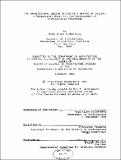The architectural design studio as a method of inquiry : a pedagogical model for the development of architectural knowledge
Author(s)
Silberberg, Ross Allen
DownloadFull printable version (7.269Mb)
Other Contributors
Massachusetts Institute of Technology. Dept. of Architecture.
Advisor
Francesco Passanti.
Terms of use
Metadata
Show full item recordAbstract
This thesis is concerned with the systematic investigation and application of knowledge within the architectural design studio. The thesis takes, as a point of departure in the development of architectural epistemology, a model of knowledge developed by Yehuda Elkana, in A Programmatic At tempt at an Anthropology of Knowledge, Science and Cultures. Sociology of the Sciences, Everett Mendelson and Yehuda Elkana (eds.) (D. Reidel Publishing Co., 1981). It is generally accepted that the design process can be characterized in a variety of ways with respect to the development and implementation of architectural knowledge. However, it is my contention that the design process, particularly [but not exclusively] within an academic setting, is best characterized as a form of critical inquiry about architecture, leading to the development of a form of architectural knowledge-contextually dependant and conventional in nature--which can be examined, tested and modified. Therefore, the goal of the design studio is two-fold. It is to help students develop a body of architectural knowledge that they can take with them beyond the individual studio. Additionally, it is to help students develop a working method to examine new material, as well as re-examine old . If we assume this position about the design studio, namely that of a method of inquiry, is correct, then it should hold true for the instructor as well. With this position in mind, the design studio becomes an investigation into such questions as "what is architectural knowledge?" and "how should it be taught?"; which can be examined, tested, and modified in the design studio process.
Description
Thesis (M.S.)--Massachusetts Institute of Technology, Dept. of Architecture, 1990. Includes bibliographical references (leaves 106-108).
Date issued
1990Department
Massachusetts Institute of Technology. Department of ArchitecturePublisher
Massachusetts Institute of Technology
Keywords
Architecture.